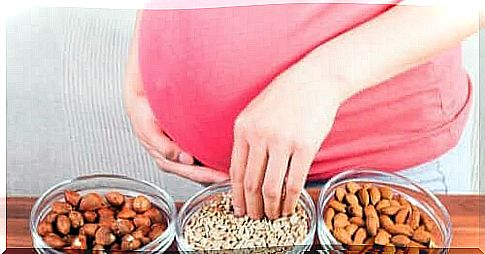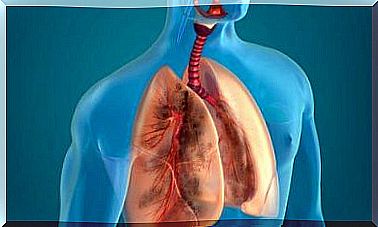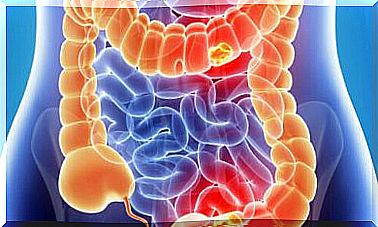A Mother’s Microbiota And The Fetal Brain

Did you know that a mother’s microbiota influences fetal brain development? Most people know that pregnancy is a critical time for fetal development and overall health.
What we didn’t know is that some diseases don’t appear until later in life. So this means that certain conditions can be related to what a pregnant woman ate and did during her pregnancy.
It’s not easy to construct a baby’s brain
The formation of a baby’s brain during fetal development pays a high metabolic price. Neurons multiply frantically and move to the future brain, starting during the first month of pregnancy. They merely follow a perfectly defined program.
The neural division rate at this stage reaches the record 250,000 cells per minute! The fetal brain development represents a large part of the total energy a mother puts into developing her baby.
The total energy cost to form a new brain is about 40,000 kilocalories over the entire pregnancy. This is more than half of the total energy costs. Research such as that published by the journal Progress in Lipid Research in 1981 confirms this.
As you can see, a baby’s brain at this stage is already dependent on what their mother eats and does, even before they are born. A mother’s gut could in fact be a related organ in fetal brain development.

A mother’s microbiota and fetal brain development
This has yet to be confirmed, but some researchers believe that intestinal infections during the first six months of pregnancy increase the risk of brain disorders in the baby. At least this is what studies report, such as the one published by The American Journal of Maternal/Child Nursing in 2018 (English link).
They would recommend some strategies to reduce the risk of infection if this is the case. These would focus on controlling the gut microbiota through controlled diets, prebiotics, and probiotics (that is, foods that help maintain a mother’s microbiota).
Diabetes can affect fetal brain development
Other studies, such as those published in 2018 in the journal JAMA , have shown that the development of diabetes (type I or type II) is a risk factor for autism in the person’s offspring.
For example, researchers have studied children by following them through the early years of life. They noted which of them developed autism and found that their mothers had type I or type II gestational diabetes.
The results showed that the risk of autistic offspring increased by 62% during the pregnancy of mothers with diabetes. However, it is not clear why this could increase the risk of autism.
Poor nutrition and junk food increase the incidence of type II diabetes. However, there are also unavoidable forms of diabetes, such as type I.

Omega fats and the risk of ADHD
A study by Spanish researchers published in 2019 found that the diet followed during pregnancy may influence the risk of attention deficit hyperactivity disorder (ADHD). The symptoms usually appear around the age of 7 years.
This study analyzed the proportion of omega-6 fatty acids versus omega-3 fatty acids that mothers ingested during their pregnancy. Both are essential for the development and functioning of the fetal brain throughout life. However, especially during pregnancy, the right amount of these fats is crucial.
There should be a sufficiently proportional intake of omega 6 and omega 3 fatty acids (a ratio of 3 to 1). Omega 6 fatty acids are especially abundant in seeds, grains, meat and vegetable oils. Omega 3 fatty acids are common in oily fish and other marine sources.
The results indicated that there was an association between the disproportionality of omega-6 fatty acids and omega-3 fatty acids and the increased risk of ADHD at age 7. Furthermore, the researchers conclude that a good diet during pregnancy can reduce the risk of ADHD in the long term.
Nuts are very good during the first three months of pregnancy
According to research published in the European Journal of Epidemiology , eating nuts (walnuts, almonds, hazelnuts, peanuts, cashews, macadamia nuts, pistachios, pine nuts, etc.) during the first three months of pregnancy improves attention, memory and learning in children.
The benefits of nuts are due to the high content of essential fatty acids (omega 6 and omega 3) and the high content of microminerals and vitamin B9. These contribute greatly to the development of the fetal brain, but especially during this crucial phase.
Interestingly, the same health benefits for the neuropsychological development of the offspring were not present in those mothers who ate plenty of nuts during the last three months of their pregnancy.

A mother’s microbiota is important, so cesarean section is not an ideal procedure
Historical developments and advances in caesarean section techniques and logistics have reduced the maternal and neonatal risks associated with the procedure. At the same time, the number of pregnant women who give birth through this procedure without medical reason is increasing.
The problem with this is that caesarean sections can affect the health of the babies born this way. Research published in the journal Medical Archives in 2013 confirms this.
According to this research, the mother’s ‘good’ microbiota is lacking in children born by cesarean section. This is because they usually obtain it through the birth canal and rectum. Meanwhile, there are often “bad” bacteria present that can harm a child’s immune system.
‘Good’ bacteria stimulate the white blood cells and other components of the newborn’s immune system in babies born vaginally. This is the basis for the hypotheses that explain the clear association between morbidity and cesarean section, as mentioned above.
Women are often careful and cautious during pregnancy and want to offer their offspring the best. There is no doubt that the ‘good’ gut bacteria are a great ally to achieve this goal. So, make sure you pay attention to your gut….literally.









